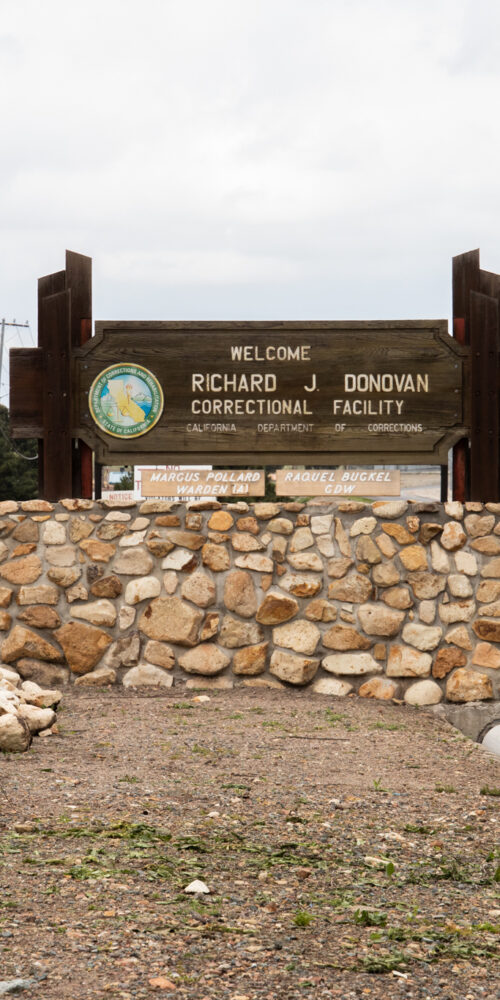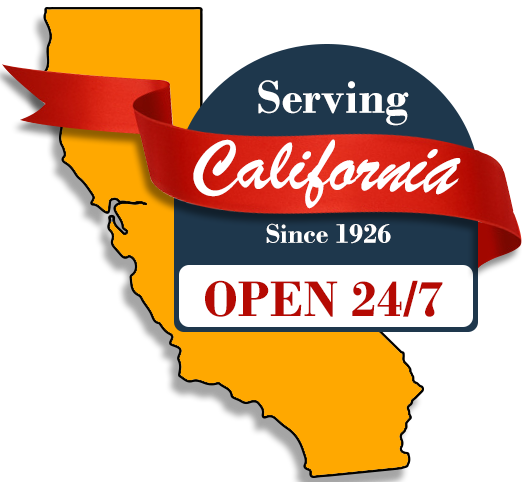Richard J. Donovan Detention Facility Overview
Facility Address:
Richard J. Donovan Correctional Facility (RJDCF) is located at:
480 Alta Road, San Diego, CA 92179
Contact Information:
To speak with facility staff, inquire about an incarcerated individual, or obtain visitation and mail information, contact RJDCF directly at:
(619) 661-6500
Visiting Hours:
Visitation at RJDCF typically takes place on weekends and holidays, though schedules vary by housing unit and inmate eligibility.
Advance approval and appointment scheduling are required through the CDCR’s Visitation Portal.
It is strongly recommended to check the CDCR website for the most up-to-date visitation procedures, rules, and any restrictions.
Official Website:
For facility details, visiting protocols, inmate locator tools, and rehabilitation program information, visit the California Department of Corrections and Rehabilitation (CDCR) page:
👉 CDCR – Richard J. Donovan Facility
🚨 Need Bail Help Before Transfer to RJDCF?
At Armstrong Bail Bonds, we assist families during the critical pre-sentencing or pre-transfer period—before a loved one may be moved to a state facility like RJDCF.
If your family member is currently held in county custody and faces prison time, we offer:
- Bail bond services for felony charges
- Pre-sentencing release coordination
- Legal system guidance and case tracking
📞 Call us at (818) 241-2171 to speak with a licensed bail agent available 24/7.

🏛️ Jurisdiction & Case Types – Richard J. Donovan Detention Facility (RJDCF)
Situated in the Otay Mesa area of San Diego County, the Richard J. Donovan Correctional Facility (RJDCF) is a high-security state prison operated by the California Department of Corrections and Rehabilitation (CDCR). As the only state prison in the county, RJDCF houses male inmates serving long-term sentences following felony convictions in Superior Courts across California.
RJDCF is designated for adult offenders and accommodates a wide range of custody levels—from minimum-security inmates nearing parole to high-risk individuals requiring maximum security measures.
👨⚖️ Adult Felony Convictions
Most individuals housed at RJDCF have been convicted of serious or violent felony offenses. These inmates are typically transferred to RJDCF following sentencing in state court and classification by CDCR’s reception centers.
Examples of felony convictions leading to RJDCF placement include:
- Homicide or attempted murder
- Armed robbery or home invasion
- Aggravated assault with a deadly weapon
- High-volume drug trafficking or manufacturing
- Sexual assault or other sex-based crimes
- Gang-related crimes or firearm enhancements
These convictions often result in multi-year or life sentences, with many offenders ineligible for parole for extended periods due to sentencing enhancements or California’s Three Strikes Law.
⚖️ Enhanced and Specialized Sentences
RJDCF also houses individuals sentenced under enhanced sentencing laws, including:
- Strike enhancements under California’s Three Strikes Law
- Gun-use enhancements under Penal Code § 12022.53
- Gang enhancements under Penal Code § 186.22
- Sex offender registration requirements under Penal Code § 290
These factors can dramatically increase the length and severity of a sentence, leading to higher security classification and long-term incarceration at RJDCF.
🧠 Mental Health & Special Housing Populations
In addition to general population inmates, RJDCF provides care and housing for inmates with specialized needs through programs such as:
- Enhanced Outpatient Program (EOP) – For inmates requiring ongoing mental health treatment
- Correctional Clinical Case Management System (CCCMS) – For those with moderate psychiatric care needs
- Administrative Segregation Units (ASU) – For individuals requiring separation due to safety, disciplinary, or legal concerns
- Protective Housing Units (PHU) – For vulnerable inmates, including former law enforcement, high-profile offenders, or individuals at risk due to gang status
These programs aim to address mental health needs while maintaining safety and structure within the prison environment.
🚔 Reception & Transfer Process
Before being assigned to RJDCF, inmates undergo intake and evaluation at a CDCR Reception Center (such as Wasco or North Kern). During this period, the state assesses the inmate’s:
- Security classification level
- Medical and mental health status
- Educational background and rehabilitative needs
- History of violence, gang affiliation, or escape risk
Based on this evaluation, RJDCF may be selected as the appropriate long-term placement due to its wide range of security capabilities and treatment programs.
⚖️ Sentencing Procedures & Legal Coordination
Inmates assigned to RJDCF have typically completed court proceedings and received final sentencing in a California Superior Court, including those in San Diego, Riverside, Orange, and Los Angeles Counties.
The path to RJDCF includes several legal stages:
- Arrest and booking
- Pretrial detention (usually in a county jail)
- Court hearings, including preliminary examination and trial
- Sentencing hearing and judgment
- Transfer to CDCR custody
While RJDCF does not conduct court hearings, inmates may occasionally be transported to county court for post-conviction proceedings, appeals, or resentencing under new laws such as SB 1437 (felony murder reform) or AB 2942 (sentence recall).
📚 Rehabilitation & Reentry Programs
RJDCF offers several CDCR-certified programs designed to support rehabilitation, skill development, and future reintegration. These include:
- GED and adult basic education courses
- Vocational training in trades like welding, construction, and landscaping
- Substance abuse treatment and counseling
- Cognitive behavioral therapy (CBT) and anger management classes
- Restorative justice and religious support programs
While participation is voluntary, inmates may earn Milestone Completion Credits to reduce their sentence when enrolled in eligible programs.
✅ Outcomes & Parole Considerations
The long-term outcomes for RJDCF inmates vary based on sentencing structure, behavior, and legal eligibility:
- Indeterminate sentences (e.g., 15-to-life) may lead to parole hearings after serving a minimum term
- Determinate sentences have fixed release dates but may allow for early release credits
- Reentry placement is possible for eligible inmates nearing release, including transitional housing and community supervision
CDCR and the Board of Parole Hearings (BPH) oversee these determinations based on safety, rehabilitation progress, and legal compliance.
How Bail Works at the Richard J. Donovan Detention Facility
When an adult is arrested in the southern region of San Diego County—especially for more serious offenses—they may be booked into the Richard J. Donovan Correctional Facility (RJDCF) after initial processing at a local jail. While RJDCF primarily houses individuals serving prison sentences, in some circumstances, pretrial detainees awaiting transfer or hearings may pass through or be temporarily held within the state’s system.
📑 The Adult Bail Process Explained
In contrast to juvenile detention, the adult legal system in California follows a more structured bail schedule. This means:
Judges often refer to countywide bail guidelines when setting bail amounts.
The amount varies based on the severity of charges, criminal history, and other circumstances.
In many felony cases, a person may be eligible for bail unless the court deems them a risk to public safety or a flight risk.
🔍 What Judges Consider When Setting Bail
The court evaluates multiple factors before granting or denying bail:
Charge Severity: Violent felonies or offenses involving weapons may result in higher bail or denial.
Criminal Background: Repeat offenders or those with outstanding warrants face stricter conditions.
Community Ties: Individuals with strong family and employment connections may be viewed more favorably.
Flight Risk Assessment: If the person is likely to flee or has failed to appear in court previously, bail may be denied.
Public Safety Concerns: The court may withhold bail if releasing the defendant poses a danger to others.
💡 Release Options for Eligible Defendants
If the judge sets bail, the individual or their family has several choices for securing release:
Pay the full bail amount to the court (refundable after case resolution).
Use a licensed bail bond company to post a bond—typically for a nonrefundable fee (around 10% of bail).
In some cases, the court may grant release on “own recognizance” (OR), especially for low-level, nonviolent charges.
🤝 How Armstrong Bail Bonds Helps with RJDCF Cases
Navigating a felony arrest involving a state-level facility like RJDCF requires experience and urgency. Armstrong Bail Bonds is equipped to help families during this stressful time by streamlining the bail process and advocating for fast release when allowed by the court.
✅ 24/7 Emergency Bail Assistance
Whether it’s late at night or over the weekend, our team is ready. We coordinate with law enforcement, county clerks, and legal professionals to get your loved one out of custody as quickly as possible.
✅ High-Bail & Serious Offense Support
We specialize in handling complex bail matters—such as violent felonies or multi-charge cases—where higher bail amounts and court scrutiny are common. We can help navigate these situations with discretion and experience.
✅ Affordable Financing Options
We understand that bail costs can be overwhelming. That’s why we offer:
Flexible monthly payment plans
No-interest financing on approved credit
Fast qualification with minimal paperwork
💳 Convenient Payment Methods for All Families
Whether you’re nearby or out of town, we make the payment process seamless:
Debit/Credit Cards
Bank Transfers & Zelle
Secure phone and email transactions
Cash payments at authorized locations
If your loved one has been detained and is facing incarceration at Richard J. Donovan Correctional Facility, reach out to Armstrong Bail Bonds today. We’re here to provide reliable guidance, fast service, and a path forward—no matter how complex the case may seem.


👩⚖️ Court Hearings & Visitation – Richard J. Donovan Detention Facility
Legal Proceedings After Booking into RJDCF
If someone you care about has been transferred to the Richard J. Donovan Correctional Facility following arrest, their legal journey is likely progressing through the San Diego County Superior Court system. While RJDCF primarily houses sentenced individuals, pretrial detainees or those in the process of court-ordered transfer may temporarily be held there.
Maintaining court compliance is critical. Missed court appearances—even during temporary custody—can lead to harsh legal consequences and setbacks in the defense process.
📆 The Importance of Showing Up to Court
Every scheduled court date matters. Whether it’s an arraignment, pretrial motion, or sentencing hearing, the court requires full compliance. Here’s how to stay on track:
- Know your court location and dates—usually at the downtown San Diego Central Courthouse
- Consult with your attorney regularly for updated hearing details
- Arrive early and prepared—including any documents or case-related materials
Failure to appear (FTA) may result in:
- A bench warrant for arrest
- Forfeiture of bail, which may jeopardize future release options
- Additional criminal charges for non-compliance
- The possibility of being remanded back into custody without bail
To avoid complications, stay in close communication with your defense attorney, bail agent, and the court clerk’s office.
👪 Visitation Rules at RJDCF
Visiting someone housed at the Richard J. Donovan Correctional Facility involves a structured process overseen by the California Department of Corrections and Rehabilitation (CDCR). Knowing the policies ahead of time can help avoid delays or denials.
📅 How to Arrange a Visit
RJDCF visitation is not walk-in based. Visits must be scheduled online through CDCR’s Visiting Scheduling Application (VSA) or by calling the facility directly.
- Schedule your visit online at cdcr.ca.gov/visitors
- Approved visitor status is required—background checks and prior clearance apply
- Plan ahead—appointments often fill up quickly, especially on weekends and holidays
👤 Visitor Rules & Requirements
To ensure a smooth experience:
- Bring valid government-issued photo ID
- Follow the CDCR dress code policy—no revealing or suggestive clothing
- Arrive early and allow time for check-in and screening
- Leave electronics, bags, and contraband in your vehicle—they’re not permitted in the visiting area
- Any disruptive or noncompliant behavior could result in immediate termination of the visit
Check the RJDCF visitation page or call the facility at (619) 661-6500 for the latest updates on visitation hours and restrictions.
✅ Armstrong Bail Bonds – Standing by Through the Entire Legal Process
At Armstrong Bail Bonds, our support doesn’t end once bail is posted. We continue working with families and defense teams to help navigate the court system, track upcoming hearings, and understand correctional policies like visitation.
📞 Call us 24/7 for assistance with court dates, visitation logistics, or bail-related questions. We’re here to guide your family with professionalism, urgency, and care—every step of the way.
Common Offenses Handled at Richard J. Donovan Detention Facility
Located in the Otay Mesa region of San Diego County, the Richard J. Donovan Correctional Facility (RJDCF) serves as a high-security state prison primarily housing adult males. While many inmates at RJDCF are serving long-term sentences, the facility also handles transfers and inmates awaiting further court proceedings. A wide range of felony offenses are represented here, many of which initially involved bail eligibility at earlier stages of the case. At Armstrong Bail Bonds, we assist families in securing pretrial release long before incarceration at RJDCF becomes permanent.
Below are several common criminal offenses associated with individuals eventually transferred to RJDCF:
🔫 Felony Assault & Violent Crimes
Many individuals incarcerated at RJDCF have been convicted of serious violent crimes, often involving bodily harm or use of weapons.
Examples of qualifying offenses:
Assault with a Deadly Weapon (Penal Code § 245(a)(1) PC)
Battery Causing Serious Injury
Armed Robbery or Attempted Homicide
Participation in Gang-Related Violence
These charges carry lengthy prison terms, and many defendants begin their legal journey at county jails where bail may be available. Armstrong Bail Bonds works quickly to secure release while legal defense strategies are still developing.
🏚️ Residential & Commercial Burglary
First- and second-degree burglary charges often lead to prison time, especially when prior convictions or enhancements apply.
Common scenarios include:
Home Invasion or Break-Ins (Penal Code § 459 PC)
Commercial Burglary After Hours
Auto Burglary or Theft from Vehicles
Repeat Offenders Facing Strike Enhancements
If your loved one was arrested on burglary charges and is now in CDCR custody at RJDCF, we may still assist others in similar circumstances by posting bail during the early phases of prosecution.
💉 Narcotics Distribution & Drug Trafficking
Drug crimes—especially those involving sales, transportation, or manufacturing—are a leading cause of state prison sentences in California.
Common felony drug charges include:
Possession for Sale of Controlled Substances
Drug Transportation or Importation
Operating a Drug House or Lab
Possession with Firearms or Gang Allegations
These charges are often filed under both state and federal law. Armstrong Bail Bonds offers fast, confidential support during pretrial stages, particularly when the case starts at the county level.
🚘 Felony DUI & Vehicular Manslaughter
Some inmates at RJDCF were sentenced due to driving-related felonies, especially when serious harm or fatalities occurred.
Frequently seen offenses:
Felony DUI with Injury or Multiple Priors
Vehicular Manslaughter While Intoxicated
Hit-and-Run Causing Injury or Death
Driving Under the Influence with a Suspended License
Bail options can exist for first-time or non-injury DUI offenses. We help families assess eligibility and expedite release when timing is crucial.
💣 Weapon Possession & Firearms Violations
California’s strict gun laws lead to numerous arrests for unlawful weapon possession—many of which result in prison terms, especially if connected to prior convictions.
Examples include:
Felon in Possession of a Firearm
Concealed Weapon Without a Permit
Gun Use During Commission of a Felony
Possession of an Assault Weapon
Armstrong Bail Bonds can assist during initial detention periods before cases reach the state correctional system, including coordination with defense counsel for bail motions.
🤝 Trusted Help When It Matters Most
At Armstrong Bail Bonds, we understand the gravity of situations that lead to incarceration at RJDCF. While many clients we assist are not yet sentenced, we also support families dealing with long-term outcomes and complex legal timelines.
If your loved one is facing serious charges—whether related to drugs, violence, or weapons—we’re here to guide you through early intervention options, including bail posting, court appearance preparation, and legal coordination.
📞 Call us anytime at (818) 241-2171 for discreet, 24/7 assistance with felony bail in San Diego County and beyond.
Frequently Asked Questions about
Richard J. Donovan Detention Facility
What is the Richard J. Donovan Correctional Facility (RJDCF)?
RJDCF is a California state prison located in Otay Mesa, San Diego County. It houses adult male inmates who have been convicted of serious or violent felonies.
Can someone post bail if they’re at RJDCF?
Typically, once someone is transferred to RJDCF, they have already been sentenced and are no longer eligible for bail. Bail is usually only available before conviction or sentencing.
How can Armstrong Bail Bonds help if someone is at risk of going to RJDCF?
We help families secure bail immediately after an arrest, before the defendant is transferred to state prison. Fast action can prevent long-term incarceration.
What types of charges can lead to incarceration at RJDCF?
Charges include violent felonies, major drug offenses, felony DUIs, sex crimes, and financial crimes like fraud or embezzlement.
Is bail available for felony offenses?
Yes, many felony offenses are still eligible for bail depending on the severity of the charge, criminal history, and risk factors. We’ll assess your case quickly.
How fast can Armstrong Bail Bonds secure a release?
We operate 24/7 and work quickly—often within a few hours, depending on the court and jail’s processing times.
What happens if bail isn’t posted in time?
If bail isn’t posted before a court date or sentencing, the individual may be remanded to custody and transferred to RJDCF or another facility.
How much does bail typically cost for felony charges?
Bail amounts vary by offense and county guidelines. We offer flexible payment plans and financing to make bail more accessible for families.
What if someone is facing drug distribution or trafficking charges?
These are serious charges, but many are still bail-eligible. We move fast to secure release before a court orders detention or transfer.
Can you help with sex offense bail cases?
We handle sensitive cases discreetly and professionally. Bail is sometimes available, depending on the specific Penal Code charge.
How do I find out if my loved one has been taken to RJDCF?
Call us—we can help locate inmates, check custody status, and provide guidance on next legal steps or court dates.



